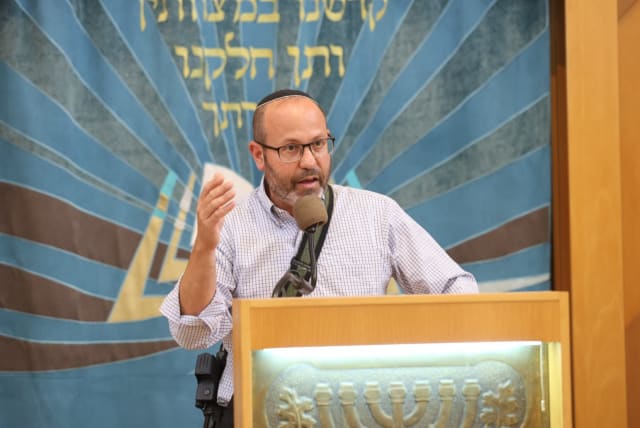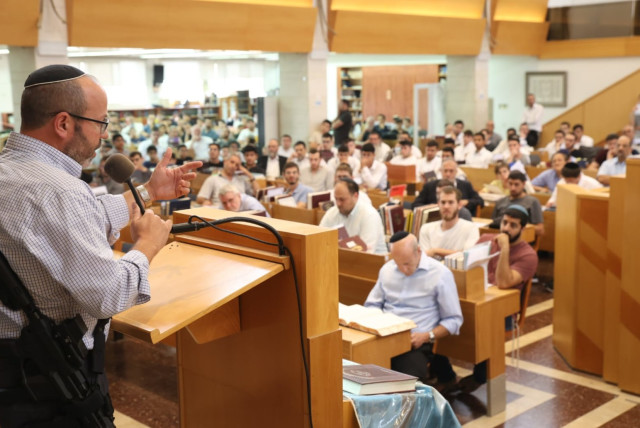Father of Gaza hostage leads prayer vigil for victims of Hamas

Zvika Mor made his remarks at an event hosted by The Jerusalem College of Technology • "Now is the time for our enemy to die for our country."
The father of one of Israel's hostages currently being held captive in Gaza led a massive vigil to bemoan the 240 Israelis and foreign nationals taken captive as well as others under the Hamas terror organization's influence worldwide. The massive prayer event was hosted by The Jerusalem College of Technology (JCT) last Thursday.
Zvika Mor, the father of one of the hostages, said at the vigil: “We don't have just 240 kidnapped Israelis [and others], but also eight million who are kidnapped by Hamas, which decides when all of us will be able to sleep peacefully at night.
“We need to be free people in our country—a country that should be free of shelters, weapons, border fences, and an Iron Dome. It’s noble to die for our country, yes, but now is the time for our enemy to die for our country.”
The event was also intended to pray for the safe passage and return of hostages, IDF soldiers, and the injured, as well as to raise the souls of those murdered at the hands of Hamas.
Families of hostages, students, and former JCT vice president Stuart Hershkowitz were all present at the vigil. Hershowitz read Daf Yomi, a daily page of Jewish learning that is frequently learned in groups.
“On Simchat Torah, when I arrived at the synagogue in the morning, we were notified that there were terrorists on the loose in Sderot. When we began praying, we thought that it must be five to ten terrorists at most: This is what I was told that morning,” Mor recalled. “ but when I returned from synagogue, I found all my family members in tears and was told my son, Eitan, had disappeared.”
Mor family shocked upon learning their son was not in Jerusalem
“When Shabbat began, we thought Eitan was in Jerusalem. I didn’t think we’d be impacted by this,” he said. “We don’t know all the details, but it seems as part of Eitan’s security detail work, he was asked to urgently come down to the South as a guard.
.
"We heard from an eyewitness that Eitan and his security partner, Elkaim, worked to evacuate the dead bodies with an ATV [all-terrain vehicle]," Mor said. "When he saw the bodies of two girls who died during the Nova party massacre, they were caught in a crossfire with Hamas and that is the last anybody heard from him.”
Authorities recovered the body of one of the girls, 14-year-old Shira Elon, who Eitan and Elkaim initially helped hide. Now, Elon is buried in Rishon LeZion.“The last thing my son did was take care of the daughters of Israel,” Mor said.
“With this war, we have no choice but to win. The country demands our dedication. I worry and am in fear for my son and I don’t know what his fate will be," the father said. "Yet, I feel God has assigned me this role and I’ve dedicated myself to advocating for the hostages and having conversations that strengthen communities.
"What is happening now, despite the enormous pain we’re in, is another episode in our tragic history as Jews. We went through the Holocaust, so this will be easy in comparison. It hurts a lot, but we must look long term," he said.
“The State of Israel is like an olive tree: Despite being planted in the most hostile of conditions, [it] blossoms to be a majestic display of love, brotherhood, and heroism that needs to be seen to be believed. I believe that we will prevail and that we will follow in the footsteps of our ancestors Yehoshua ben Nun and Caleb ben Yefunei.”
.
(These two biblical figures were the only ones among the tribal leaders, who scouted the Land of Israel in advance, to encourage the Israelites to enter it, despite the others' reservations about doing so.)
.
Rabbi Yosef Zvi Rimon, head of JCT’s Beit Midrash (Jewish study hall) was also in attendance and responded to the events. “At the beginning of Sukkot I learned about the 1929 riots in Palestine. I remember thinking to myself, that if we had an army then like we have today, this would not have happened. 133 Jews were killed then and this tragedy is buried into every Jew’s mind as something we will never forget."
.
"That figure, though, is only 10% of the casualties we suffered on October 7," he said. "So this begs the question: How do we respond to this new reality?
While it’s difficult and tragic, we must not approach this war out of fear, but out of strength; not out of weakness, but out of recognizing our stature in the world," the rabbi said. "I see in our soldiers determination, strength, and zeal—and that we’ll never forget what they did to Jewish people.”
Jerusalem Post Store
`; document.getElementById("linkPremium").innerHTML = cont; var divWithLink = document.getElementById("premium-link"); if (divWithLink !== null && divWithLink !== 'undefined') { divWithLink.style.border = "solid 1px #cb0f3e"; divWithLink.style.textAlign = "center"; divWithLink.style.marginBottom = "15px"; divWithLink.style.marginTop = "15px"; divWithLink.style.width = "100%"; divWithLink.style.backgroundColor = "#122952"; divWithLink.style.color = "#ffffff"; divWithLink.style.lineHeight = "1.5"; } } (function (v, i) { });

